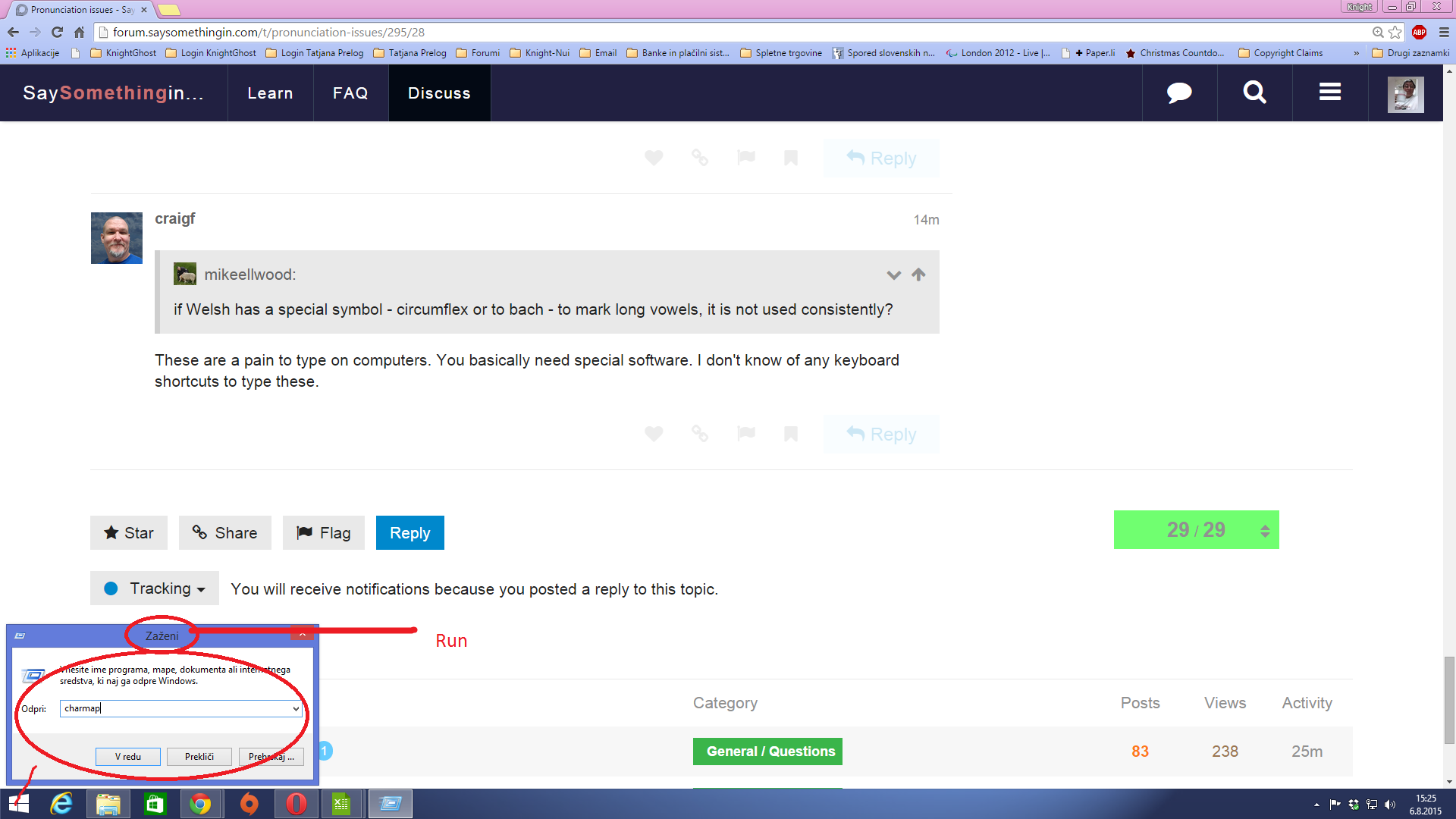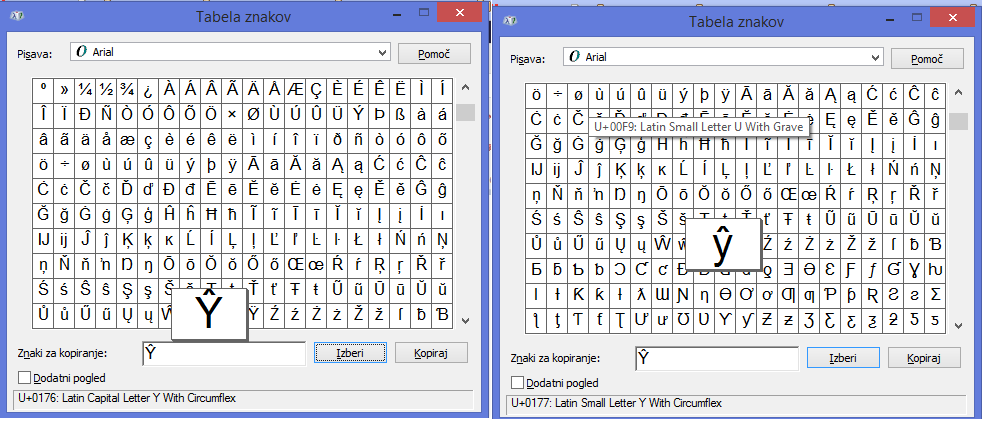What about this?

It works in Windows 8 too (I’ve just tested to open). This map might include all the characters. You can either copy/paset or see the shortcut when clicking on particular character.
Well the “to bach” utility is one way. I agree that typing the circumflex is generally a bit of a pain, but as it already exists in the language for some words, I just wonder why they are not used consistently (and even the textbooks admit this).
One can get the free “to bach” programme via this link:
http://www.bangor.ac.uk/cymorthcymraeg/to_bach.php.en
which in turn links here:
http://www.interceptorsolutions.com/products/tobach
I had tried this unsuccessfully on my old XP system and gave up on it. But having moved to W7, I recently gave it another try and it worked perfectly.
Exactly, my point. Most people won’t bother with that kind of hassle. ŵ and ŷ do not have keyboard shortcuts.
Well when you think about it, English has a lot of inconsistency too. Some of it has to do with pronunciation changing over time and spelling not keeping up.
Um, well, I give up on this too. I went through the whole charmap and yes, those two “y” have shortcut, but it’s rather complex to type

but “v” for that matter is not in the charmap at all. So, I should probably try @mikeellwood’s links aswell.
Anybody knows about good spellchecker which would be maybe compatible with Polaris Office? (I don’t own Microsoft Office and I actually found Polaris Office great substitution which can be synced for android devices too so you have your documents always at hand and can write, save and whatsoever on other devices then just PC aswell.)
True of course. English is beyond hope as far as spelling reform is concerned.
But Welsh is relatively more phonetic than English. So all I am asking is that all long vowels are marked with circumflex, and not just some of them. This would be a help to learners.
However…
That’s a good point of course. And regional variations are another complication.
“Charmap” is useful in some cases, but not really practical if you have to write a lot of words containing these special characters. As far as Welsh is concerned, the “to bach” programme, if it will install and run ok on a system you have access to, really takes the hassle out of ŷ,Ŷ,ŵ, Ŵ, and the rest of them. Failing that, http://welsh.typeit.org or something similar can be helpful.
See also this thread: Welsh Characters with UK Keyboard
(I couldn’t actually get Hector’s method to work on my W7 system - probably needs another Windows component installing in the case of my particular computer).
Eh, @mikeellwood keep with W7 as long as you can and they can suit you. W8 (I’ve just got it yesterday with my new PC) causes tons of problems. I’ll try to instal “to bach” to see if it works on this “problematic” software. Hopefully it does. Thank you very much. 
I’d forgotten that. I tend to think ‘aspirant’ at the sight of an ‘h’!! I hope I haven’t misled anyone, but I always sound my ‘h’s’!! Maybe we shoild ask @aran ? I know @Iestyn rarely sounds an ‘h’ but that’s his local accent!!
Two separate replies in one post to @MickDavies:
Don’t worry about the difference between v and th - you can;t hear them clearly because they are pretty similar. If you use the wrong one in conversation, there is every chance that the person you’re talking to will “mishear” the correct sound anyway! You certainly won’t be misunderstood any more than you would misunderstand someone saying “I fink vat (think that) as well”.
On the forum “similar subject” issue - you can over-ride it. One of the buttons says something like “post anyway”. Sometimes that will be a better option, and sometimes you’ll be better to rejuvenate an old thread like this.
And the other points…
The absence of the to bach accent on most long vowel sounds is something that just is, I’m afraid. I’m quite thankful for that as well - it would be a nightmare having to put a to bach on every long vowel, especially as South Eastern speakers tend to elongate more vowels than the rest of the Welsh do.
On to the pronunciation of mh, nh etc: The problem with these is that they are an approximate rendition of the sound that speakers make. think carefully of the difference between p and b - you spit the p more than you do the b, sort of blowing through the letter to give the (ex)plosive quality of the sound. The h of Mh gives the same plosive quality to the m
Mh is not really a separate letter to p, but a sort of extension of the same letter, said differently. Try saying a p but allowing the air to escape down your nose at the same time.
Alternatively, just say m and n, like I do! (There’s no h in South Wales. Oh, poo, yes there is…)
Thanks. I will continue to persevere. Blame my mum for it bugging me, she is an English teacher and I had things like that drummed into me. haha
My family did the same to me, actually. I’d been taught All through childhood that there’s a ‘right’ and a ‘wrong’ way to speak, so it’s hard not to freak out a little when you can’t work out the ‘right’ pronunciation.
It can be tough - but Wales doesn’t have an equivalent of ‘Queen’s English’ - and I think the idea that there is one right way to speak even English has died off in the last twenty or thirty years (and good riddance!). So although it means rewriting some scripts, you’ll benefit hugely from getting more casual about it 
That’s true. I guess the challenge is just rewiring my brain so that I don’t think of language in terms of ‘right’ and ‘wrong’. It’s being rather stubborn to change in that respect!
Ohoh, I dunno about that. Unfortunately, from what I’ve seen on the net, people still complain about really small grammatical differences and different dialects (eg. AAVE, Indian English).
My problem in all this pronunciation thingy I’ve (newly) just faced doing my video is that “f” will always be “f” and not “v”. As concerns gramatical thingys - I don’t really bother too much especially now when I’m on Clecs and can see all sorts of clecs being published … I just go with the flow at least when I’m writing things down.
But that “f” … This should be my brainshift obviously.
I suppose some products of Eton and Oxford may, but I thought the fact that the BBC now has major newsreaders from Llanelli, Glasgow, and a lot of other places on main news on the main channel shows that ideas have changed since I was a child!!! I notice what would have been seen as grammatical errors all the time!!! I don’t complain. Words are changing their meaning and I mutter under my breath at the use of “arguably” to mean “certainly”!!! The main news programmes now come from Salford!!! Good for the BBC!! But we need more programmes made in English in Cymru and more Scottish programming in Scotland!!
I mean Americans, if not anyone English. Most of the what people call “grammar nazis” I come across in the net are Americans, as far as I know.
Besides that, I think there are still problems in perception of dialects in England that need solving and improving on, especially towards dialects associated with working-class and country people (eg. Brummie, other West Country dialects, Scouse, others). There’s definitely good stuff going on: the overall attitude to Cockney for instance is much better than it has been in past decades, but there could be more going on.
I learned “ardderchog” from an old childrens game online (don’t know where it was or if it is still there) called “Snapdragon” where, every time you did something right, a dragon popped up and said “Ardde-e-e-e-er cog!” I just imitated him for a bit, and there it was.
@Znex you might like this little snippet I just found from Gareth King’s “Basic Welsh - A Grammar and Workbook”, page 72, Unit 26:
He is talking about the “rule” that inflected verbs (verbs with endings, aka short forms) are normally unmutated in the statement form, take soft mutation (if possible) in the question form, and take aspirate mutation (if possible) in the negative.
It has to be said, however, that this pattern, neat though it is, is rarely found in the spoken language.
[…]
So you are just as likely, if not more likely, to hear in speech welodd e, welodd e? and welodd e ddim, and equally dalodd e, dalodd e?, and dalodd e ddim. This is a sore point with traditionalists. Then again, tradition, by its nature, is a thing of the past, and meanwhile the language moves on.
(Gareth seems to be that apparent contradiction: a strong supporter of grammar, but not of prescriptive grammar).